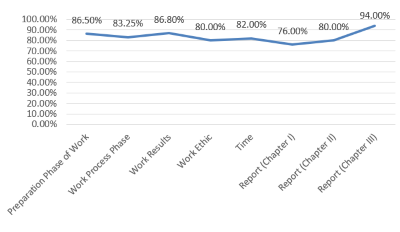The Implementation of Project Based Learning in the Concrete Practice Course
DOI:
https://doi.org/10.24036/cived.v10i3.45Keywords:
Project Based Learning, Stone, ConcreteAbstract
A learning model that can be implemented in the Stone and Concrete Practice course is the Project Based Learning (PjBL) model, which emphasizes project-based learning. The objective of this research is to provide a description of the implementation of project-based learning in the stone and concrete practice courses. This study employs a Pre-Experimental Design utilizing a One-Shot Case Study design. The instrument utilized in this research is the assessment of skills in Project Based Learning. From the results of the study it can be interpreted that the application of Project Based Learning in the Stone and Concrete Practice course obtains the proportion of Respondent Achievement Level (TCR) of the six assessment components of 83.85% which belongs to the good category. Consequently, the application of the Project Based Learning learning model in the Stone and Concrete Practice course leads to an improvement in students' masonry and concrete work skills.
Downloads
References
M. Radovic-Markovic, “Creative Education and New Learning as Means of Encouraging Creativity , Original Thinking and Entrepreneurship,” Think. Ski. Creat., 2013.
S. Saparahayuningsih, “Peningkatan Kecerdasan dan Kreativitas siswa,” J. Kreat. J. Kependidikan Dasar, vol. 1, no. 1, pp. 1–6, 2010.
Undang-Undang Republik Indonesia Nomor 20 Tahun 2003 Tentang Sistem Pendidikan Nasional. 2003.
T. Suciani, E. Lasmanawati, and Y. Rahmawati, “Pemahaman Model Pembelajaran Sebagai Kesiapan Praktik Pengalaman Lapangan (Ppl) Mahasiswa Program Studi Pendidikan Tata Boga,” Media Pendidikan, Gizi, dan Kuliner, vol. 7, no. 1, pp. 76–81, 2018.
S. Nuryatin, “Adaptasi Metode Pembelajaran Melalui E-Learning Untuk Menghadapi Era New Normal,” OSF Prepr., vol. 2, no. 1, pp. 1–8, 2020.
B. Joyce, M. Weil, and E. Calhoun, Models of Teaching (edisi Kedelapan) : model-model pengajaran, 8th ed. Yogyakarta: Pustaka Pelajar, 2011.
Rusman, Model-Model Pembelajaran. Jakarta: Rajawali Press. PT Rajagrafindo Persada, 2012.
M. A. Subandri, “Implementasi Blended Learning sebagai Pengembangan Model Pembelajaran Di Smk Negeri 1 Bengkalis,” vol. 3, no. November, pp. 167–173, 2022.
D. P. Tinggi, Buku Panduan Merdeka Belajar-Kampus Merdeka (1st ed.). Direktorat Pendidikan Tinggi Kemendikbud RI, 2020.
D. Alawi, A. Sumpena, S. Supiana, and Q. Y. Zaqiah, “Implementasi Kurikulum Merdeka Belajar Kampus Merdeka Pasca Pandemi Covid-19,” Edukatif J. Ilmu Pendidik., vol. 4, no. 4, pp. 5863–5873, 2022, doi: 10.31004/edukatif.v4i4.3531.
M. Syafei, J. Silalahi, J. T. Sipil, F. Teknik, And U. N. Padang, “Pengaruh Model Pembelajaran Problem Based Learning Terhadap Hasil Belajar Siswa Pada Mata Pelajaran Mekanika Teknik Kelas X Desain Pemodelan Dan Informasi Bangunan,” Vol. 5, No. 4, Pp. 1–6, 2019.
J. Educatio, “Penerapan Model Auditory Intellectually Repetition ( AIR ) untuk Meningkatkan Kemampuan Berbicara Pada Mahasiswa,” vol. 7, no. 1, pp. 252–259, 2021, doi: 10.31949/educatio.v7i1.959.
S. A. Yalçin, Ü. Turgut, and E. Büyükkasap, “The effect of project based learning on science undergraduates’ learning of electricity, attitude towards physics and scientific process skills,” Int. Online J. Educ. Sci., vol. 1, no. 1, pp. 81–105, 2009, [Online].

Downloads
Published
How to Cite
Issue
Section
License
Copyright (c) 2023 Anggun Agni Zaus, Nurhasan Syah

This work is licensed under a Creative Commons Attribution 4.0 International License.







2.jpg)
